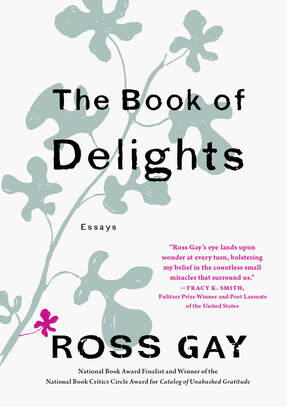The Book of Delights by Ross Gay

Hardback: 288 pgs
Publisher: Algonquin Books (2019)
Purchase @ Algonquin Books
Review by Emily Donovan.
A Commitment to Delighting
The title of award-winning American poet Ross Gay’s new book The Book of Delights contains its own review: delightful. It is Gay’s first nonfiction book but is equally committed to relishing the natural world, friends and family, and pleasant strangers as Catalog of Unabashed Gratitude and his other poetry books. The book was a challenge Gay posed to himself to write an essay about something delightful daily for a year, starting and ending on his birthday. He set rules for himself of drafting them quickly and writing them by hand. In a relatable move, Gay confesses in his prologue that he skipped some days, and the book actually only includes 102 entries. Each one earns their diminutive title of essayette, as the longest is eight small pages and the shortest is three sentences.
Readers of Gay’s poetry will notice many of the same themes and strategies he uses in poems deployed in these essays. The tangential thoughts and images that lend surprise and higher meaning to Gay’s poems like “ode to buttoning and unbuttoning my shirt” can be risky in prose, as they can feel distracted rather than intentional, but Gay deploys them gratifyingly at times. In an entry about delighting in inefficiency, he writes, in part, “I come from people for whom–as I write this, lounging, sipping coffee, listening to the oatmeal talking in the pot–inefficiency was not, mostly, an option” (5). Here, Gay’s inefficient style emphasizes the delight he takes in inefficiency itself. His voice throughout demands that these essays be read with the same patience and willingness to follow joy where it leads with which he wrote them.
The goal of the book was “more like the development of a delight muscle” for him, a practice that “implies that the more you study delight, the more delight there is to study” (xii). The subjects of the essays prove this belief. Some essays discuss topics commonly recognized as delightful–the freedom to occasionally blow off a task, being called baby by a flight attendant or hon by a waitress–and others, less so–most notably when he delights in the relief of having chosen to pee his pants while driving. His gentle interpretation of small experiences can offer a refreshing view of the world as, for example, he describes a sign that cautions passersby that
there are bees on the bridge as a “sign that said the bees belong here as much as we do” (211). Gay writes with a tenderness that rubs off on a willing reader.
The collection also contains delightfully humorous situations. Gay and his buddy play a two-on-two pickup basketball game initiated by a swaggering “young guy from the other side of the court” where Gay describes going on “to kick the shit out of them, 21 to 0,” reflects on that as a horrible figure of speech, and only then reveals that the other team was made of 12-year-olds (253, 253). Gay collects his own nitrogen-rich urine to help his garden grow, discusses preferred urine-to-water ratios, and then tells us about the time, after picking his partner’s daughter up “after softball practice or camp or something,” where she almost drank his urine because it was sitting in his car cupholder yellow in a Gatorade bottle (243).
This is not to say that the book lacks the heft of things that are short of delightful. The undelightful is incorporated alongside the delightful and often is part of what makes the delightful so noteworthy. For example, Gay discusses a documentary titled Hole in the Head about the death of Vertus Hardiman. Hardiman was one of a group of black child test subjects who had a hole burned into his head by severe levels of radiation. Still, that essay opens by delighting in “weird vernacular sayings that roll off the tongue” like “I need x like I need a hole in my head” (14).
For Gay, delight despite sufferings is a political choice. He writes about “the commodification of black suffering” and how “one of the objectives of popular culture, popular media, is to make blackness appear to be inextricable from suffering, and suffering from blackness” (220). The existence of a “book of black delight” taken in as “daily as air,” therefore, is more than simply one man’s year-long writing exercise (220). It contains a compassionate voice which contributes to a much-needed, joyous movement in American popular culture.
Emily Donovan is an MFA student in creative writing at Florida Atlantic University, where she is visual arts editor of Swamp Ape Review. She is originally from the midwest. Her fiction is forthcoming at FIVE:2:ONE.
